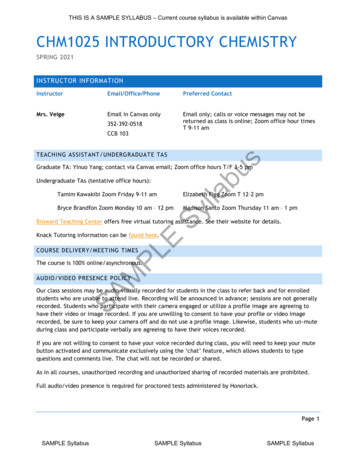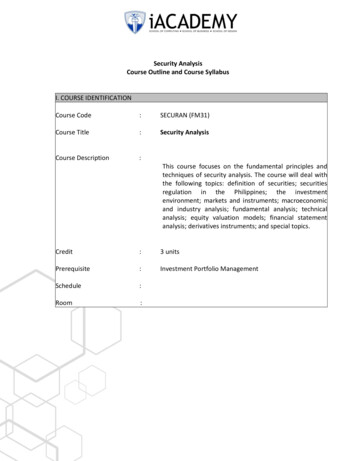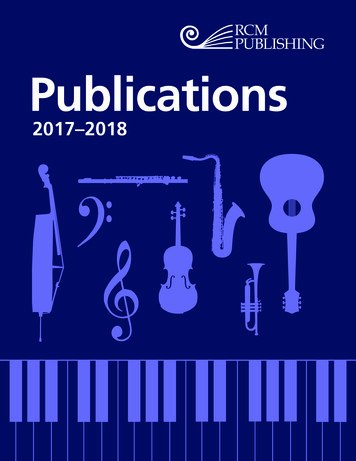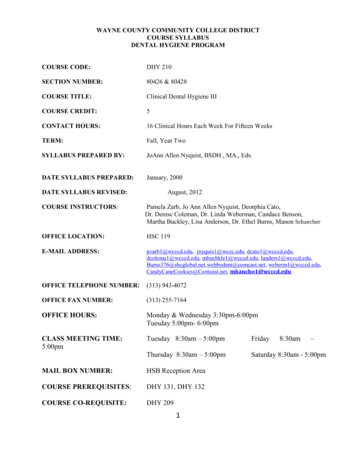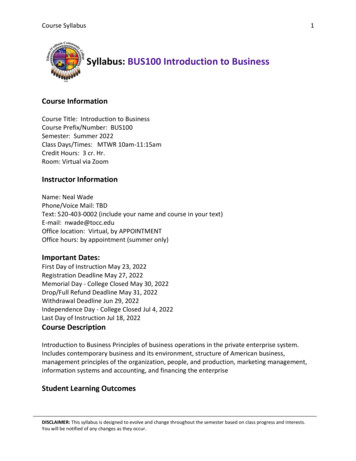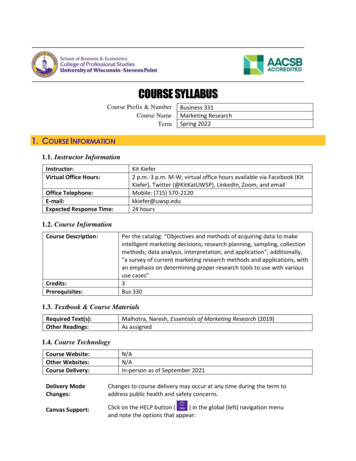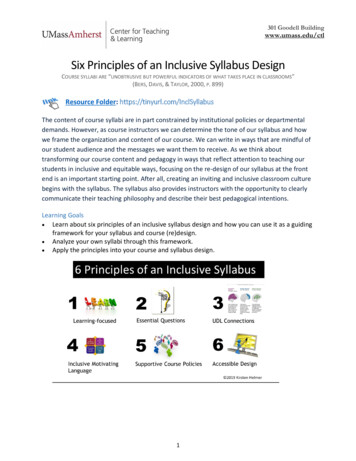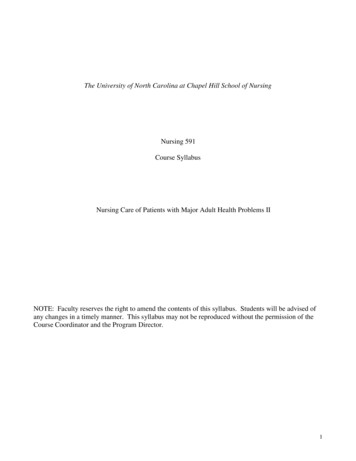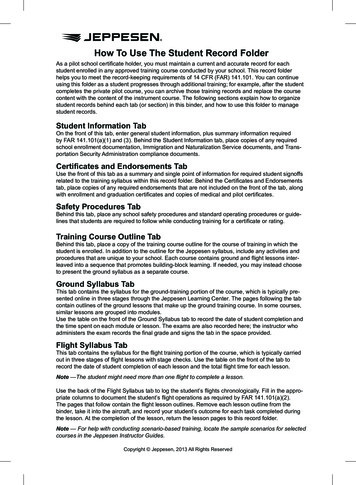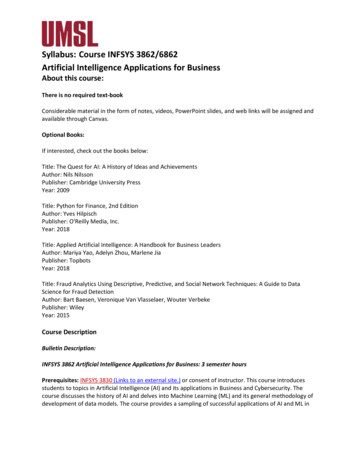
Transcription
Syllabus: Course INFSYS 3862/6862Artificial Intelligence Applications for BusinessAbout this course:There is no required text-bookConsiderable material in the form of notes, videos, PowerPoint slides, and web links will be assigned andavailable through Canvas.Optional Books:If interested, check out the books below:Title: The Quest for AI: A History of Ideas and AchievementsAuthor: Nils NilssonPublisher: Cambridge University PressYear: 2009Title: Python for Finance, 2nd EditionAuthor: Yves HilpischPublisher: O'Reilly Media, Inc.Year: 2018Title: Applied Artificial Intelligence: A Handbook for Business LeadersAuthor: Mariya Yao, Adelyn Zhou, Marlene JiaPublisher: TopbotsYear: 2018Title: Fraud Analytics Using Descriptive, Predictive, and Social Network Techniques: A Guide to DataScience for Fraud DetectionAuthor: Bart Baesen, Veronique Van Vlasselaer, Wouter VerbekePublisher: WileyYear: 2015Course DescriptionBulletin Description:INFSYS 3862 Artificial Intelligence Applications for Business: 3 semester hoursPrerequisites: INFSYS 3830 (Links to an external site.) or consent of instructor. This course introducesstudents to topics in Artificial Intelligence (AI) and its applications in Business and Cybersecurity. Thecourse discusses the history of AI and delves into Machine Learning (ML) and its general methodology ofdevelopment of data models. The course provides a sampling of successful applications of AI and ML in
Syllabus: Course INFSYS 3862/6862Artificial Intelligence Applications for Businessdifferent areas of Business such as portfolio management, algorithmic trading, fraud analytics, andcredit scoring.Credit cannot be granted for both INFSYS 3862 (Links to an external site.) and INFSYS 6862.INFSYS 6862 Artificial Intelligence Applications for Business and Cybersecurity: 3 semester hoursPrerequisite: Graduate standing. This course introduces students to topics in artificial intelligence (AI)and its applications in business and cybersecurity. The course starts with a historical development offundamental ideas in AI and their relationship to the state of the art. The course then introduces one ofthe most successful branches of AI- machine learning (ML), and its general methodology of thedevelopment of data models. The course provides a sampling of successful applications of AI and ML indifferent areas of business such as portfolio management, algorithmic trading, fraud analytics, andcredit scoring. Credit cannot be granted for both INFSYS 3862 (Links to an external site.) andINFSYS 6862 (Links to an external site.).Student background:A background in programming (preferably in Python) is required. Since Python programming language iswidely used in AI, the course will introduce you to basic programming idioms from Python.Broad Learning Outcomes:After completing this course, student should be able to: Identify the latest AI technologies within the conceptual framework of AI as viewed bypractitioners and researchersUnderstand the role of AI in the larger context of an enterpriseDevelop predictive data models using machine learningPredict the direction of stocks using financial data modelsPredict customer churn and lifetime valueDevelop data models for fraud and intrusion detectionPerform demand forecasting for supply chain managementCourse Topics:The following topics will be covered:oIntroduction to AI Approaches to AI Branches of AI Waves of AI - Historical Progress Myths about AI
Syllabus: Course INFSYS 3862/6862Artificial Intelligence Applications for Business oRole of AI in BusinessIntro to Python Data types in Python oooooLists and TuplesDictionaries and SetsFunctions and ObjectsBasics of Numpy and PandasBasics of Scikit-LearnGoogle Colab programming environmentMachine Learning in Python Discover and Visualize the Data Data Preparation Select and Train the Model Fine-tuning the Model Commonly used learning algorithmsApplications in Finance Basics of Corporate Finance Stock direction prediction Calculating Beta of a stock Fama-French modelApplications in Marketing Churn Prediction Customer Lifetime Value Customer SegmentationApplications in Cybersecurity Fraud detection Intrusion detectionApplications in Supply Chain Demand ForecastingHow to Succeed in This CourseThis online course is divided into "modules". Each module will have reading material, lecture videos,lecture slides, and assignments. The assignments will either be in the form of a quiz, discussion,programming assignment, or a written assignment you upload to Canvas. Each module is designed to be completed in two weeks. It is best that you pace yourself and tryto complete the modules within that time.If this course were offered on campus, you’d be in class 2.5 hours/week plus travel time. Theonline version is no different in terms of expectations for your involvement. This is an activeonline course that requires 3 hours of your time each week in addition to the time it takes youto read the required materials, watch the videos, and complete the assignments. That means
Syllabus: Course INFSYS 3862/6862Artificial Intelligence Applications for Business that you need to plan to spend a minimum of 6 hours every week (up to 9-10 hours a week) onactivities related to this course. If you are worried about your preparedness, consider taking theOnline Readiness Survey (Links to an external site.) to help decide if an online course is right foryou.If something is not clear please contact the instructor.If this is your first online course, I recommend you complete the Online Course Overviewlisted in your Canvas course list. If you’ve already completed the orientation, you do not haveto retake it but you can refer to it for helpful videos and tutorials about the technologies used inthis course.Assessment/GradingGrading Components:Students are expected to demonstrate learning by participating in discussions, completing assignments,and taking quizzes. There will be one final comprehensive exam. In addition to these, graduate studentsare required to work on individual term papers. Thus, your grade will be calculated as follows:Course ComponentWeight UndergraduateStudentsWeight GraduateStudentsQuiz/Assignment60%60%Final Exam30%15%Individual Research Papers (GraduateStudents only)n/a15%Discussion and Engagement10%10%Maximum Possible Final Score:100%100%Grading Scale:Letter grades will not be assigned to individual components of the course. Only points (numeric scores)will be assigned. These scores will be combined into a Final Score (a Weighted Total) out of 100,rounded to one decimal place. Depending on this final score, your overall letter grade for this course willbe determined as follows.
Syllabus: Course INFSYS 3862/6862Artificial Intelligence Applications for BusinessFinal score ranges and corresponding letter grades 94A70-73.9C90-93.9A-66-69.9C-86-89.9B 62-65.9D 82-85.9B58-61.9D78-81.9B-54-57.9D-74-77.9C 54F (fail)Grading Scale: The UMSL Grading System is based on a four-point scale. The grade value for each lettergrade (shown in table above) is available gradingtext (Links to an external site.). At the same link,please also see the policies for, EX Excused, DL Delayed, and FN Failure/Non Participation gradeassignments.Feedback and Grading Timeline:Most quizzes should provide immediate feedback and scores. You can find your scores from the Gradesbutton in this course on Canvas. Other assignments may take longer to grade but I will make everyattempt to return scores within 10 days of assignment due date. If there is a rubric attached to theassignment, you can click your score to see my personal feedback on the rubric.Course PoliciesCourse Work:1. I expect students to complete all readings and other work as per schedule.2. Assignment/Quiz submission deadlines will be clearly stated. Late submissions will receivedeductions of 10% for each 24 hour period after the due date until no points remain. I willconsider exceptions only when a student has provided an acceptable reason (e.g., family/healthemergency, unavoidable work related travel).3. I will make announcements on Canvas. I strongly encourage you to visit this course underCanvas regularly for important updates and documents.4. Please check your UMSL email account regularly for information/updates regarding this course.Academic Integrity/Plagiarism You are responsible for being attentive to and observant of University policies aboutacademic honesty as stated in the University’s Campus Policies and Code of StudentConduct found in the UMSL Bulletin
Syllabus: Course INFSYS 3862/6862Artificial Intelligence Applications for Business Academic dishonesty is a serious offense that may lead to probation, suspension, ordismissal from the University. One form of academic dishonesty is plagiarism – the useof an author's ideas, statements, or approaches without crediting the source. Academicdishonesty also includes such acts as cheating by using any unauthorized sources ofinformation and providing or receiving unauthorized assistance on any form of academicwork or engaging in any behavior specifically prohibited by the faculty member (e.g.,copying someone else’s answers on tests and quizzes). Unauthorized possession ordistribution of academic materials is another type of academic misconduct. It includesthe unauthorized use, selling or purchasing of examinations or other academic work,using or stealing another student’s work, unauthorized entry or use of material in acomputer file, and using information from or possessing exams that an instructor didnot authorize for release to students. Falsification is any untruth, either verbal orwritten, in one’s academic work. Facilitation is knowingly assisting another to commit anact of academic misconduct. Plagiarism, cheating, and falsification are not acceptable.All instances of academic dishonesty will be reported to the Office of Academic Affairswho will determine whether you will appear before the Student Conduct Committee forpossible administrative sanctions such as dismissal from the university. The instructorwill make an academic judgment about the student’s grade on that work in this course.The campus process regarding academic dishonesty is described in the “Policies” sectionof the Academic Affairs website.Follow the AMA style for your reports.Plagiarism is the use of another person’s words or ideas without crediting that person.Plagiarism and cheating will not be tolerated and may lead to failure on an assignment,in theclass, and dismissal from the University, per the UMSL academic dishonesty policy.Students are responsible for being attentive to and observant of campus policies aboutacademic honesty as stated in the University’s Student Conduct Code.To avoid accusations of academic dishonesty, please submit all written work to theTurnitin System before finalizing what you submit for evaluation. Check informationabout The Writing Center on UMSL’s website.Title IX PoliciesIn adherence to the policies of Title IX and to promote a safe and secure educationalenvironment, it is strongly recommended statements similar to those below be added toyour course syllabus: Mandatory Reporting: Under Title IX, all UMSL faculty, staff, and administrators (withlimited exception) are obligated to report any incidents of sexual harassment, sexualmisconduct, sexual assault, or gender discrimination to the Student Affairs office and/orother University officials. This ensures that all parties are protected from further abusesand that victim(s) are supported by trained counselors and professionals. Note: Thereare several offices at UMSL (e.g., Counseling Services, Health Services, CommunityPsychological Service, Center for Trauma Recovery, and Student Social Services) whose
Syllabus: Course INFSYS 3862/6862Artificial Intelligence Applications for Businessstaff are exempt from Title IX mandated reporting, when the information is learned inthe course of a confidential communication. Content Advisory: The course requires good logical skills and knowledge of materialsfrom the pre-requisite courses. Some of the concepts require abstract thinking andability of apply college level algebra.Student ResourcesAccess, Disability and CommunicationYour academic success is important. If you have a documented disability that may have animpact upon your work in this class, please contact Disability Access Services (DAS) immediately.Students must provide documentation of their disability to the office of Disability AccessServices in order to receive official University services and accommodations. The staff isavailable to answer questions regarding accommodations or assist you in your pursuit ofaccommodations. Information about your disability is confidential. Once DAS reviews yourmedical documentation, they will provide you with the information and steps to inform meabout the accommodations to which you are entitled. Your accommodations will begin as soonas we discuss your approved accommodations. 144 Millennium Student Center (MSC)Phone: (314) 516-6554Email: Tara Cramer, cramert@umsl.eduWebsite: http://www.umsl.edu/services/disability/Office of International Students and Scholar ServicesIf you have difficulty communicating in English with the instructor of this course, contact ISS. 362 Social Sciences & Business Building (SSB)Phone: (314) 516-5229Email: iss@umsl.eduWebsite: http://www.umsl.edu/ intelstu/contact.htmlStudent Enrichment and AchievementSEA provides comprehensive support and intervention strategies that support your road tograduation! 107 Lucas HallPhone: (314) 516-5300Email: umslsea@umsl.eduWebsite: https://www.umsl.edu/services/sea/
Syllabus: Course INFSYS 3862/6862Artificial Intelligence Applications for BusinessOffice of Multicultural Student Services (MSS) and the University Tutoring Center (UTC)MSS provides comprehensive student retention services to diverse student populations; throughtheir tutoring center, the MSS offers comprehensive tutoring services free to students at UMSL. 225 Millennium Student Center (MSC)Phone: (314) 516-6807Email: multicultural@umsl.eduWebsite: https://www.umsl.edu/ mcraa/index.htmlMore Student Resources are on the Learning Resource Lab website.Technical SupportCanvasIf you have problems logging into your online course, or an issue within the course site, pleasecontact theTechnology Support Center: Phone: (314) 516-6034Email: helpdesk@umsl.eduWebsite : http://www.umsl.edu/technology/tsc/If you are having difficulty with a technology tool in Canvas, consider visiting the Canvas StudentGuides, which has overviews of each tool and tutorials on how to use them.If you continue to experience problems or just have questions, you can also contact theLearning Resource Lab: Phone: (314) 516-6704Email: lrl@umsl.eduWebsite: http://www.umsl.edu/technology/lrl/VoiceThread Online Contact Form: https://voicethread.com/support/contact/ Website: https://voicethread.com/howto/
Syllabus: Course INFSYS 3862/6862Artificial Intelligence Applications for BusinessAcademic SupportMath Academic Center (Math Lab)The Math Academic Center offers free individual assistance on a walk-in basis to students needinghelp with any mathematics from basic math through calculus or any course involvingmathematical skills. 222 Social Sciences and Business Building (SSB)Website: her Support Services:A variety of academic, non-academic, and technical support services are available on campus. Pleasevisit Student Resources (Links to an external site.) to get information.
Syllabus: Course INFSYS 3862/6862 Artificial Intelligence Applications for Business. staff are exempt from Title IX mandated reporting, when the information is learned in the course of a confidential communication. Content Advisory: The course requires good logical skills and knowledge of materials from the pre-requisite courses.


